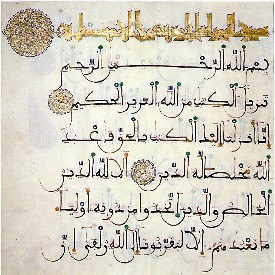| Key Terms in
Islam |
 |
Abu Bakr: Muhammad's father-in-law
and first political successor (caliph)
'Ali: Muhammad's son-in-law
and cousin, the first after Khadija to accept Muhammad's teaching; the
fourth caliph and the first Imam of Shi'ite Islam
Allah: literally means,
'the God"; Muslim name for the diety
Caliph: from khalifa
(literall, 'deputy,' 'representative'); successors of Muhammad in leading
Islam.
Dervish: literally means,
"one who comes to the door"; member of a Muslim monastic order
Fakir: literally means,
"poor man"; member of a Muslim monastic order
Five Pillars: the basic obligations
individual Muslims observe: 1) the profession of faith, 2) daily
prayer, 3) the alms tax for the needy, 4) fasting during the month of Ramadan,
and 5) taking the hajj at least once.
Hadith: Aribic for "speech,
news, event"; refers to the narratives of what Muhammad said, did, or was
like when he established the first Muslim community in Medina. Next
to the Qur?n the major source for determining Muslim law (Sharia)
Hajj: pilgrimage each
Muslim is supposed to make once in a lifetime to the shrines in and around
Mecca
Hijrah: literally means,
"migration"; the migration of Muhammad and his disciples from Mecca to
Medina in 622 C.E.
Iblis: Fallen angel who is
the Satan figure in Islam
'Id al-Adha: Muslim feast
of sacrifice
'Id al-Fitr: Muslim feast
of fast breaking. Celebrates a return to normal life after the prolonged
fast of Ramadan
Imam: literally means, "one
who stands before"; in Sunni Islam, the leader of worship in the mosque.
In Shi'ite Islam, a spiritual successor to Muhammad who is endowed with
the power to interpret the truth in the age in which he lives.
Jihad: literally means, "struggle";
referring to the obligation of all Muslims to struggle against error.
In one sense refers to the defensive military struggle against those who
would attack Muslims and subvert their faith, hence the concept of the
'Holy war'
Kaaba: literally means, "cube";
the central shrine of Islam, located in the Grand Mosque of Mecca.
It symbolizes the center of the world and is visited by Muslims on the
hajj.
Khadija: Muhammad's wife and
the first to accept his teaching
Koran (Qur'an): literally
means, "reading," "recitation"; Muslim scripture
Mahdi: literally means, "the
guided one"; in Islam in general, a descendant of Muhammad who will restore
justice on earth. In Shi'ite Islam in particular, a messianic imam
who will appear to end corruption.
Mosque: Muslim house of prayer
Muezzin: One who calls the
Muslim community to prayer five times a day
Muslim: literally means, "submitter"
(one who submits to the will of God); one becomes a Muslim by utterance
of the Shahadah: "There is no God but Allah, and Muhammad is his
prophet."
Ramadan: month during which
devout Muslims do not eat or drink between sunrise and sunset. The
fast celebrates the month in which the Prophet received the Qur'an.
Shahadah: Creedal statment
of Islam: "There is no God but Allah, and Muhammad is his prophet."
Sharia: the path or way Muslims
are to follow; hence, Muslim 'law'
Shi'ite: literally means,
"the party of"; this Muslim group, which accounts for approximately 14%
of all Muslims, split from Sunni over the issue of rightful succession
to Muhammad
Sufi: literally means, "woolen";
Muslim group that seeks a mystical knowledge of God
Sunni: the largest of the
two main branches of Islam; where the Qur'an is not explict this
movement appeals to Sunna (the manner of behavior associated
with Muhammad; via hadith)
Surah: Chapter division within
the Qur'an
Umma: literally means, "community";
the entire community of Muslims throughout the world
Wahhabi: Ultraconservative
Muslim movement founded in the 18th Century and oppoed to all forms of
change within religion and culture

